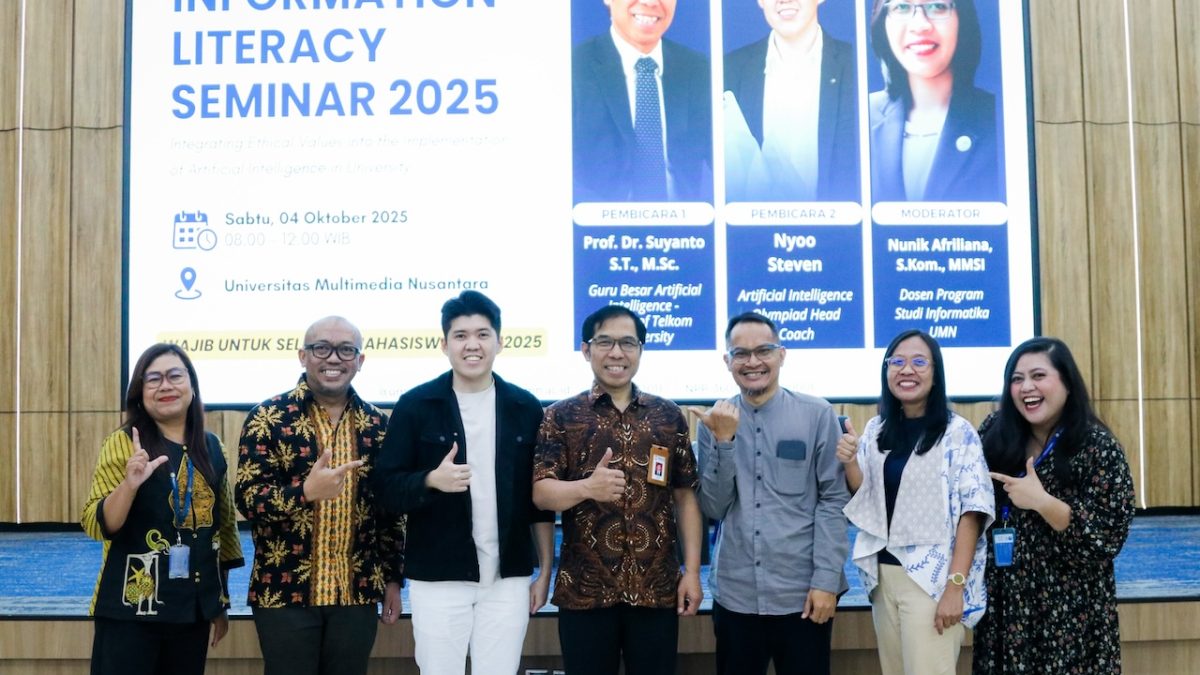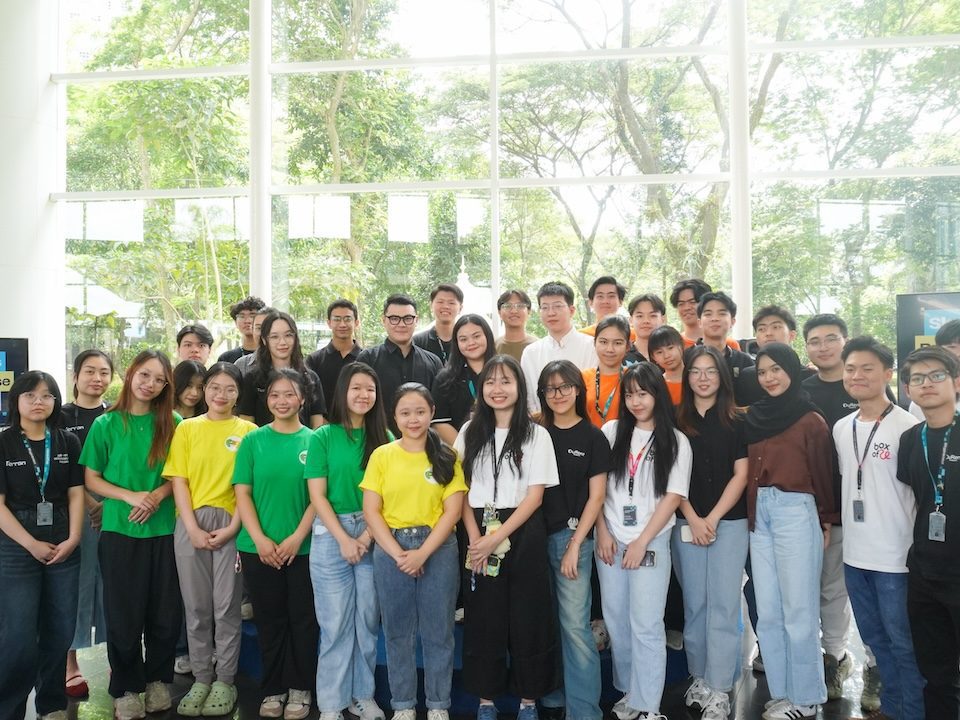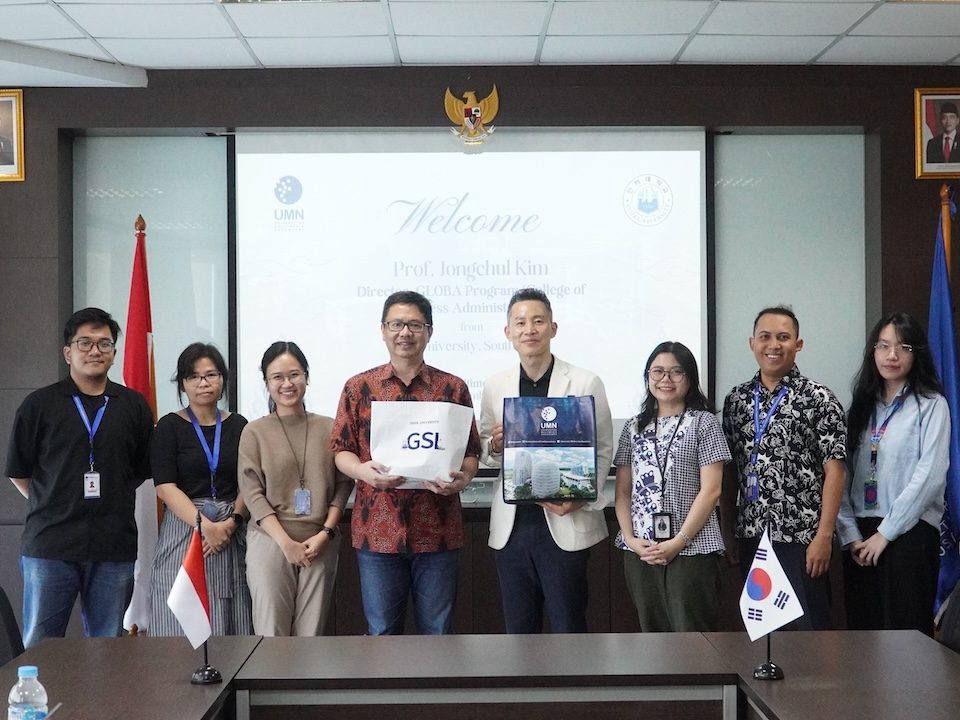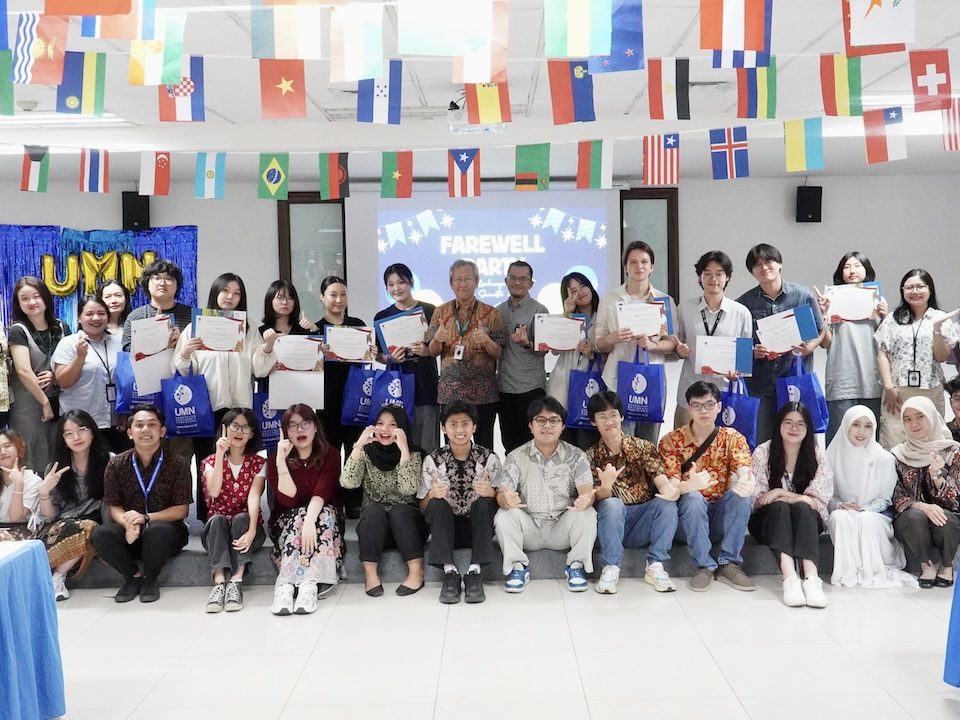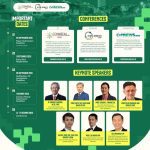
CIC 2025 Ready to Present Global Academic Collaboration in a Hybrid Format
October 12, 2025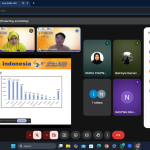
UMN Informatics Student Wins Best Presentation Award at SPSH 2025 International Conference
October 12, 2025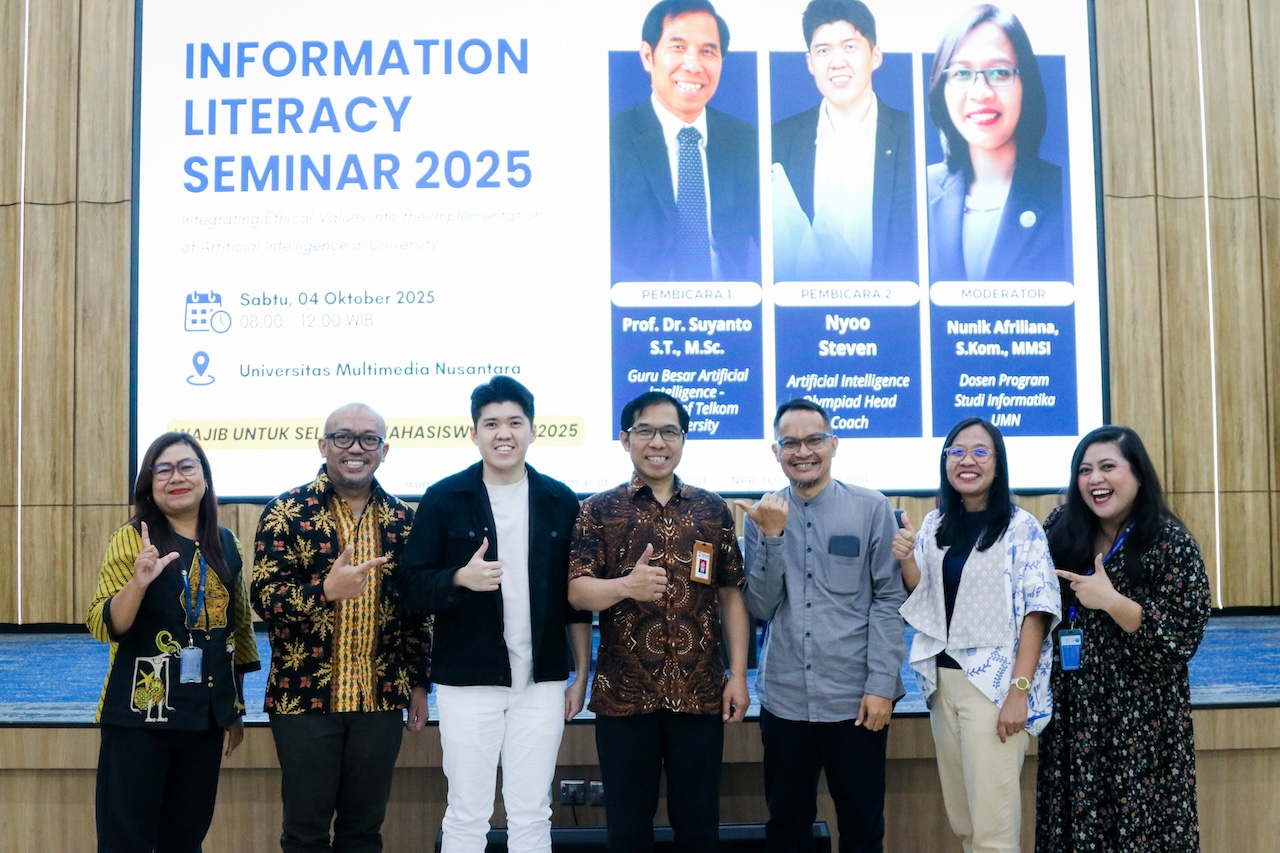
Group photo of UMN lecturers and speakers. (Doc. UMN)
Tangerang, Saturday (10/04/25) – The Universitas Multimedia Nusantara (UMN) Library held the Information Literacy Seminar 2025 with the theme “Integrating Ethical Values into the Implementation of Artificial Intelligence in Universities.” The seminar invited Prof. Dr. Suyanto, S.T., M.Sc., and Nyoo Steven as speakers.
Opening the event, Dr. Ir. Andrey Andoko, M.Sc., Rector of UMN, spoke about the role of Artificial Intelligence (AI) today, especially in higher education.
“AI brings about major disruptions that change how humans work and learn. Although it increases efficiency, AI also poses the risk of dependence and loss of critical thinking skills. Therefore, humans need to have skills that surpass AI, which include creative thinking, problem solving, communication, and ethics in the use of technology,” Andrey said.
Nunik Afriliana, S.Kom., MMSI, a lecturer in the Informatics study program at Universitas Multimedia Nusantara (UMN), moderated the event. The first session featured a presentation by Prof. Dr. Suyanto, ST, M.Sc., Rector of Telkom University (Tel-U). Better known as Prof. Suo, he has had a career spanning more than 30 years in artificial intelligence (AI). He has 128 international publications, 35 copyrights, 10 patents, and several books to his name. According to Oxford University and Elsevier, he is also listed as one of the most influential scientists.
According to Prof. Suo, the development of AI does not stop at this point. AI is still being developed into machine learning and then deep learning. However, this development has also created new phenomena such as ‘post-truth’ and ‘post-human’.
“AI today no longer uses linguistic methods, but sequence-to-sequence. What goes viral is considered truth, like a stochastic parrot. Thus, the term ‘post-truth’ emerged, where what is wrong is considered right simply because most people say so. For example, ChatGPT reflects human psychology in America because most of its data comes from there. This then gave rise to the term ‘post-human,’ where humans begin to doubt their worth as humans,” Prof. Suo said.
Prof. Suo stated that due to its immense capacity, AI can process billions of data points in a short time.
“There is already so much data recorded within AI that it can calculate probabilities up to one billion steps ahead. Therefore, AI must also be trained, as each result influences the next, and each word influences the next,” he added.
However, humans still have an irreplaceable role. Humans remain special because they possess empathy and humanity that AI does not have. According to Prof. Suo, people who cannot utilize AI will lose out to those who can. He explains the difference between mass humans (highly educated and knowledgeable about AI) and mean humans (moderately educated or laymen). As a result, the first group is superior. To illustrate this, Prof. Suo wrote the books “Rollercoasteran Bareng ‘Pacar’” and “Maratonan Bareng ‘Pacar’,” which discuss AI in a light and creative language.
“In one chapter of the book ‘Marathon with My Girlfriend’, there is a poem with each line containing 29 letters, because I wrote it on January 29, 2024. This kind of creativity is impossible for AI to do or replace. Therefore, AI excels in capacity and accuracy, while humans excel in creativity and humanity,” Prof. Suo said.
However, Prof. Suo also noted that AI poses significant risks, particularly in affective, cognitive, ethical, and social aspects, as well as security and privacy. For this reason, he urged universities to equip students with AI literacy, develop AI usage guidelines, and provide official AI tools. He emphasized the importance of maintaining integrity for students.
“At Tel-U itself, we just released guidelines for AI use a month ago. So, to students, the use of AI is indeed allowed or even required, but please do not claim AI-generated results as your own. Because even when checked using an AI detector, false accusations still often occur,” urged Prof. Suo.
Prof. Suo also warned students not to enter personal data into AI systems because privacy must be maintained. He added that universities are responsible for data sovereignty, culture, nationhood, and humanity.
Closing the first session, he emphasized that AI is here to support learning, not to undermine integrity. Students are expected to build motivation, equip themselves with AI literacy, maintain academic integrity, and use AI as an enrichment tool, not a substitute.
“As my motto says, ‘Harmonizing empathy and professionalism for human enlightenment’. Empathy does not mean pity, and professionalism means working with ethics,” he concluded.
The second session was led by Nyoo Steven, Artificial Intelligence Olympiad Head Coach, with a presentation titled “AI for Education.” Steven is the coach of the Indonesian AI National Team, which won three silver and one bronze medals in Indonesia’s debut at the International Olympiad in Artificial Intelligence (IOAI) 2025. He has also won over 10 AI competitions. He is an alumnus of the Faculty of Computer Science, University of Indonesia (Fasilkom UI), and the Indonesian Computer Olympiad Team (TOKI) in 2021.
Responding to Prof. Suo’s presentation, Steven agreed that AI works through data collection, model training, and prediction based on patterns.
“AI does take the majority answer, or what is commonly called majority voting. Therefore, when asking AI, ask ten times and take the majority answer, but don’t forget to reconfirm. Because Chat GPT can hallucinate,” he explained.
Steven explained that prompt engineering is an important skill when interacting with AI. According to him, there are currently two methods: zero-shot, which involves asking directly without examples, and few-shot, which consists in providing a few examples first. He also shared other tips for interacting with and asking questions of AI.
“If you want to ask about theory, ask like a 10-year-old. Specify the topic, the criteria, and what you don’t understand. Don’t be lazy,” Steven advised.
According to Steven, the ability to create good prompts is one of the first steps in upgrading skills in using AI. Based on PWC research (June 2024), 76% of employees believe that generative AI creates new opportunities and abilities. Meanwhile, Microsoft (May 2024) reported that 66% of companies will not recruit employees without AI skills.
“At the Faculty of Computer Science, University of Indonesia, a chatbot is being developed to create personalized learning tailored to students’ learning styles. This is a follow-up to my thesis. In my opinion, AI in education should not only be used to assist learning, but also to understand how it works. Students need to learn about AI, not just learn with AI,” Steven added.
Although he supports the use of AI in education, Steven emphasized the importance of AI ethics, especially since human work and AI work are now difficult to distinguish. He mentioned the threat of deep fakes, such as face swapping or manipulation.
“The ethics of using AI are permission, verification, and citation. Make sure you have permission, double-check the AI results, and cite honestly when using AI. The principle is that AI must uphold the principles of explainability, safety and privacy, as well as involvement between teachers/lecturers and students,” Steven emphasized as he concluded his presentation.
The event then moved on to a Q&A session, ending with door prizes for the most active participants.
By Tangika Valencia | UMN News Service
English translation by Levina Chrestella Theodora
Kuliah di Jakarta untuk jurusan program studi Informatika| Sistem Informasi | Teknik Komputer | Teknik Elektro | Teknik Fisika | Akuntansi | Manajemen| Komunikasi Strategis | Jurnalistik | Desain Komunikasi Visual | Film dan Animasi | Arsitektur | D3 Perhotelan , di Universitas Multimedia Nusantara.

